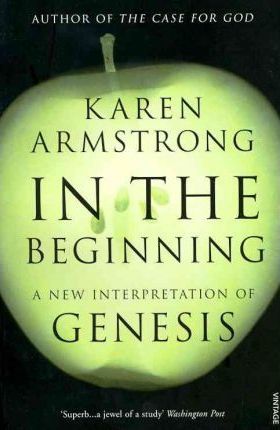Karen Armstrong’s Pathology of the Patriarchs

God wanted a fight so he created Karen Armstrong. Before her there were duels with Abraham and Jacob. Noah did not have the stomach for that sort of thing hence the world drowned. Between pacifists, pugilists and divinity, narratives that have shaped the faiths of over three billion people were contrived.
The result: a mixed grill. There were blessings and curses, dysfunctional families, endogamous marriages, murderous, sibling rivalries and heart-wringing betrayals. And thanks to Armstrong’s lethal injections, no one was left unbruised.
God wanted a fight so he created Karen Armstrong.
Say you were Isaac. Your father just earned himself a divine acclaim for uncommon display of faithfulness. How he earned it? Oh! He tied you up, blindfolded you and placed you on a stash of wood you saw him arrange for a burnt offering. He took a knife and was going to plunge it into your chest before a voice stopped him.
I see you’re shivering. Calm down. What impact that had on your psyche? I could only imagine. No actually, I couldn’t. And how did mummy take it? Well, I read she didn’t live nearly as long as daddy; not that I’m suggesting her heart couldn’t take it. At stake was the faith, not to mention the blessing, of half the world, let’s focus on the bigger picture.
True enough Genesis is not big on morality. That much Armstrong stated. However, the largest chunk of her book dissected the lives and choices of the protagonists of God’s earliest recorded relationships with man.
Armstrong takes a scalpel to each character in the greatest stories ever told and asks us to examine far deeper than we would be allowed from the pulpit. Noah worked hard to save his family and some animals while the rest of the world drowned. Abraham worked hard to bless the world and in the process probably psychologically damaged his family. While we quiver at his awe-inspiring fits of faith, dare we ask: ‘was he a great daddy?’
“Genesis is true to life here. It shows no paragons. Even the great patriarchs of Israel had feet of clay. Moments of grace and inspiration in their lives are frequently followed by episodes which showed these men to be as flawed, negligent, self-indulgent, apathetic, and egotistical as any of us lesser mortals,” writes Armstrong.
Genesis is an invitation to wrestle with world views that prevailed before the God of Israel announced his arrival.
While the patriarchs got the rap, the women faired better. Although men in those cultures were always regarded as heads, the women were the necks that turned those heads wherever they wanted them to go. They manipulated the men to influence and even establish the destinies of their progenies. Patriarchy was all bark.
Sarah edged out Ishmael for Isaac. Rebekah did same for Jacob over Esau. Nothing new there. They learned from the best. In the beginning, God himself edged out Cain for Abel.
In the beginning: A New Interpretation of Genesis is more than just a pathology of the patriarchs. It reminds us that the first book of the bible is a rejoinder to ancient myths. A new God appeared on the scene and decided things must change. Ancient cultures had gods and their creation myths were fantastic. Marduk, the ancient Babylonian god, formed the sky and the earth by splitting Tiamat into two.
In Genesis there could only be one God, Yahweh. And on Yahweh’s honour, no such drama was necessary. He simply spoke things into being.
In fact, Genesis suggests that polytheism was the cradle of confusion. A deft play on words rendered Bab-Ilani, a Chaldean word for ‘gate of the gods’, as ‘Babel’, meaning ‘confusion’, and later to Babylon. It is an invitation to wrestle with world views that prevailed before the God of Israel announced his arrival.
And that’s something Armstrong does so well: invitation to fisticuffs. Her approach was to turn it into a free-for-all rumble. The wrestling started with Abraham challenging God to be just, as God prepared for a showdown at Sodom and Gomorrah. Then there was an all night face-off between Jacob and ‘a mysterious figure’. After that fateful account, the name of the man of destiny was changed to Israel, meaning: ‘one who fights with God’.
While Armstrong herself may not have intended it, the only one that comes out of her endeavour with a modicum of redemption is God.
While Armstrong herself may not have intended it, the only one that comes out of her endeavour with a modicum of redemption is God. He may have asked people to do unbelievable stuff in the name of faith, he did not stop them from challenging his prerogatives if they had good reasons.
Abraham did with Sodom and Gomorrah and scripture says ‘he remained standing’ as he did. Jacob did all night and was blessed for it. Noah, the only one too squeamish to ask questions, ended his life as an alcoholic and discredited.
That’s where In the beginning… succeeds the most. If you were one to say yes to everything the Bible says, this book will affect you. It will encourage you to wrestle with scripture as ‘purposefully as Abraham’ engaged God. What the author didn’t pay as much attention to was the novelty of a God who desired a relationship with his creations. No god before Yahweh cared that much. That’s perhaps the most important revelation in Genesis.


